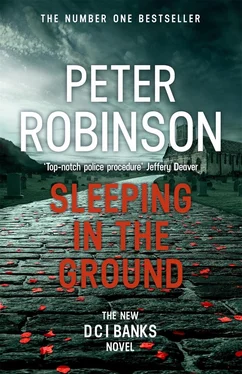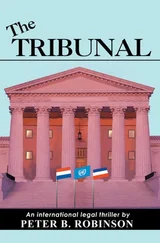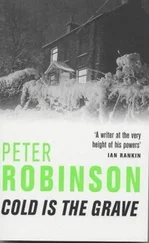‘So what’s he likely to do next?’ Gervaise asked. ‘Is he a psycho?’
‘It would take far too long to go into the ins and outs of that diagnosis,’ said Jenny. ‘But the short answer is no, I don’t think he’s a psychopath, but I do think there’s a very good chance he’s the one you’re looking for. At least he’s not a “psycho” in the sense most people understand the term. He’s certainly suffering from some sort dissociative disorder, and he appears to lack a conscience, or he wouldn’t have been able to do what he did at the wedding. But perhaps his experiences in Kosovo, Afghanistan, Northern Ireland, Iraq and wherever else he fought did that to him. Dehumanised him. There may be reasons for that desensitisation in his military training and experience. After all, DC Masterson’s source has already told us not only that Vincent trained as a sniper, but that he had no compunction about killing complete strangers from a distance, a positive quality in the army’s eyes, but perhaps not so in civilian life. And we know that Vincent couldn’t make the adjustment to civilian life. His criminal activities and prison record show that to some extent. He also exhibited some symptoms of PTSD, though he was never diagnosed or treated for it. The lack of ability to form and maintain relations is an important factor here.’
‘But PTSD doesn’t make murderers, does it?’ said Gervaise.
‘We don’t know what makes murderers. If we did, we’d all be out of a job. I’m simply talking about the sheer mental burden this man is walking around with, not speculating on what it might cause him to do. And at the root of all this, or tangled up in it somehow, is his sister’s murder. That’s something he doesn’t appear to be able to let go, even fifty years after it happened. And I think we are all agreed that the triggers were there in the cold case, Frank Dowson’s imprisonment, finding out that Maureen didn’t turn up as promised and, finally, the news about the forthcoming wedding. More than enough for someone in as fragile a state of mind as I imagine Mark Vincent is. Gerry, do you know what happened to the Vincent family in the immediate aftermath of the murder?’
Gerry shuffled through the pages of her notes. ‘The parents split up three months after Wendy’s murder. The father moved to Sheffield and remained on the dole. He died of cirrhosis in 1988. The mother went home to her own parents in Salford and sent Mark to live with an aunt and uncle in Ferry Fryston, near Castleford. There was an incident recorded in 1967. The details are a bit vague, but Mark Vincent was taken into care for a while.’
‘Abuse?’ said Gervaise.
‘Sounds very much like it, ma’am. Naturally, the details are scrappy after so long, but the police and social services were involved, and there was an investigation of sorts before he was returned to the family. His aunt and uncle, that is. That’s when Vincent first started getting in trouble with the law. Small stuff at first, shoplifting, handling stolen goods, starting little fires, then graduating to more serious stuff like muggings and the occasional burglary. As my source said, it was jail or the army. His mother cleaned up her act. Detox, AA. She died of a stroke in 2004.’
‘Any brothers or sisters still living?’ Jenny asked.
‘Not according to my records.’
‘Drugs? In connection with Vincent.’
‘No mention,’ said Gerry. ‘Neither dealing nor using. Though my source did say that alcohol abuse was a significant factor in his later violent behaviour, and other drugs may have been involved. But there’s no evidence, or even suspicion, that he was a heroin addict, for example, or a cokehead.’
‘So what exactly do we do now?’ asked Gervaise. ‘Take Maureen Tindall into protective custody?’
‘I’d suggest discreet surveillance,’ said Banks. ‘It gives us more chance of nabbing him in the act if he goes after her. But it’s not without risk of scaring him off.’
‘Maybe you should give her a choice,’ Jenny said.
‘She’s not in good enough shape to make one,’ said Annie. ‘She’s in a state of constant anxiety, she’s scared all the time, jumps at shadows, feels guilty, ashamed. I know I’m not a psychiatrist, but there you are, that’s my opinion, for what it’s worth.’
‘You’re probably quite right,’ said Jenny. ‘And those issues would certainly throw her decision-making ability out of whack, to use a technical term.’
Even Annie smiled at that.
‘Get an unmarked car to the Tindall house now,’ said Gervaise. ‘Tell them to park down the street and try to remain unobserved,’ Gervaise said. ‘And arrange to have someone watching the back, if there’s access that way. You know the lie of the land better than I do.’
‘Should we tell Mrs Tindall what we’re doing, ma’am?’ Gerry asked.
Gervaise glanced at Jenny, then at Annie. ‘Well, you two?’
‘No,’ they both said at once.
‘It would only alarm her, cause her to panic,’ Jenny said.
‘I think we should get her and her husband out of the house,’ said Banks. ‘Panic or not. Put them in a hotel or somewhere to make sure of their safety. Unless he’s watching at the time, he won’t know they’re not there. If he is watching, maybe that’ll give us a chance of capturing him. At least that way nobody’s in danger, and we still stand a chance of getting our man.’
‘But not of catching him in the act,’ Annie said.
‘It doesn’t matter. We’re not going to use Maureen Tindall as bait. And don’t forget, all we have is circumstantial evidence and a very strong suspicion of Vincent’s guilt. We’ll need more than that if we want to get a conviction, and I’m hoping we’ll get it when we have him in custody and question him, search his premises. I think we’re all agreed that right now the main thing is finding him, right?’
They all agreed.
‘Good,’ said Gervaise. ‘Make it so.’
Before they could all return to their respective tasks, a soft tap at the door was followed by the entry of a uniformed constable.
‘Yes?’ said Gervaise, shoving her files into her briefcase.
‘Ma’am.’ The constable took a deep breath, then said, ‘Just heard from dispatch that they’ve had a 999 call from a Robert Tindall. He’s the hus—’
‘I know who he is,’ said Gervaise. ‘What did he want?’
‘They couldn’t make out what he was saying, ma’am. Not all of it. Said his voice sounded funny. But they think he said something about being hurt. They’ve sent an ambulance and a patrol car, but I just thought—’
‘Thank you, Constable. Good thinking,’ said Gervaise, and glanced at Banks. ‘Better get over there, hadn’t you?’
Banks and Annie set off for the Tindalls’ house as the rain started to fall again, gently at first, then harder. Behind them were two patrol cars with their lights flashing and sirens blaring. It wasn’t far, but by the time they got there the uniformed officer on duty outside the house informed them that Robert Tindall had been taken to A & E on the orders of the paramedic. He couldn’t say whether Tindall’s injuries were life-threatening or not, but his partner, who was still inside the house, had felt for a pulse and found one, and when the paramedics had pushed him out on a gurney, his head had been bandaged. So he was alive when they took him to hospital.
Banks noticed that the front door was splintered around the chain, which was hanging loose. It looked as if the door had been on the chain when Robert Tindall, or Maureen, had answered it, and whoever was standing there had kicked it open. There was something resembling a scuff, possibly made by someone’s foot, on the front of the door.
The second patrol officer, who had remained inside the house, led them along the hall and showed them into the kitchen, where Tindall had been found. Banks and Annie stopped in the doorway to avoid contaminating the scene any further. There wasn’t much to see, though there had clearly been a brief struggle, as a few plates lay broken on the floor, along with slices of some oranges and bananas, knives and forks scattered among the wreckage. There was also a pool of dark blood.
Читать дальше












